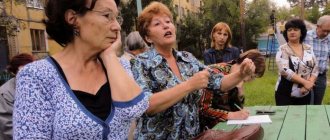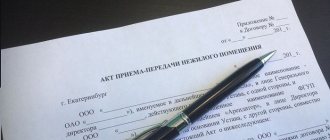The housing association maintains documentation that reflects all the basic information about the owners of the premises.
In addition, association board members interact personally with many residents and can provide personal references, which are often requested by law enforcement. Dear readers! To solve your specific problem, call the hotline or visit the website. It's free.
8 (800) 350-31-84
Act of actual residence - what kind of document is it and what is it for?
In simple terms, this act records exactly who lives (or not) in a certain apartment or house.
It is interesting that this document does not appear in any laws or even in the Housing Code. The only mention of it is contained in the Decree of the Government of the Russian Federation No. 354 “On the provision of utility services to owners and users of premises in apartment buildings and residential buildings.” However, the document is used in different situations.
Which organizations need it and why?
- Utility services.
According to the Decree of the Government of the Russian Federation, the consumer of utility services is obliged to inform the contractor (that is, the service provider) about the number of people living in the apartment. The act is submitted to the management company within five days (working days).
In addition, this document is needed to recalculate utility bills. For example, the owner leaves for a long period of time. Or lives elsewhere. If there is no act, then payments are calculated according to the number of homeowners.
But this is the case if he does not have metering devices installed. Metering devices include water, gas and heat meters.
- Management Company.
The management company needs an act on the number of residents to calculate utility bills and determine the actual load on the house.
- The Federal Migration Service.
If a person does not live at the address at which he is registered, then the FMS deals with this matter. Especially foreign citizens and stateless persons temporarily staying in Russia.
- Investigative authorities.
The police need information about your actual residence. For example, if there is an eviction case or an illegal rental case.
Thus, this document has a very wide scope of application by various authorities.
How does an act differ from a certificate?
An act of non-residence at the place of registration can be drawn up by employees of the Homeowners Association, Management Company, Housing and Communal Services, bailiffs, passport office specialists or local police officers. The commission must be formed of at least three people.
The document is prepared in the presence of the owner of the premises or his legal representative. A form is filled out based on information obtained during a survey of neighbors. Current legislation gives the right to draw up such an act to private individuals.
These could be landlords, property owners, neighbors. Such a document is often called a certificate.
To draw up an act, other documents may be required confirming the citizen’s non-residence in a specific apartment:
- certificate of temporary registration of a person at another address. It is issued at the Main Department of Migration Affairs of the Ministry of Internal Affairs, the passport office. You can also submit a request to receive it at the Multifunctional Center. Such a document confirms that the person does not currently live at the old place of registration;
- a certificate from the place of work confirming the fact of working and living in another area.
Who can draw up this document
The owner himself has the right to draw up an act (if he needs a recalculation of utilities or intends to rent out the premises).
In case of official need, it can be drawn up by representatives of the authorized bodies listed in the previous paragraph - representatives of the migration service, district inspector, bailiffs, housing office employees.
It happens that the act is drawn up by neighbors. We will discuss this option in a separate paragraph.
In order for the document to have legal force, it is necessary to draw up a commission. The commission usually includes neighbors, housing office workers, police officers or a local inspector. One representative from each body. They jointly draw up a deed and sign it.
Certificate of residence, form
You can write it manually or fill out a ready-made form.
No special form of the document is fixed anywhere, but it, like all official documents, is subject to generally accepted requirements:
- details (last name, first name, patronymic, registration or actual location address) of the applicants and the person being inspected;
- information confirming or refuting the residence of the person being inspected in this territory;
- evidence (if available);
- data of commission members;
- signatures of all those present.
If the owner refuses to sign, this is noted in a separate column.
You can attach data from a survey of witnesses, who are neighbors.
Download the form for the act of actual residence from this link. ⇐
How to write an act of residence from neighbors, features of drafting
If the owner illegally rents out an apartment, and the tenants disturb the silence or do not comply with sanitary and hygienic standards, neighbors can draw up a certificate of occupancy.
The emphasis should be on the fact that the owner of the apartment himself does not live in it. You can contact the Housing Office. There they will confirm the fact of non-residence of the owner and issue a corresponding certificate.
You can now contact the police with these documents. And they will continue to act in accordance with the law.
Sample certificate of residence from neighbors
When filling out an act from your neighbors, you must indicate the passport details and exact addresses of the applicant neighbors, a detailed description of the situation and the signatures of all those present.
The document can be certified by a representative of the management company or a local inspector.
You can download a sample act. ⇐
The procedure for drawing up the act
When registering, you must adhere to the following sequence of actions:
- Decide on the composition of the commission. For this purpose, it is necessary to interview neighbors about their consent to participate in such a procedure, and, if necessary, to additionally confirm their testimony.
- Conduct an inspection of the residential premises at the agreed time to establish the fact of residence or non-residence.
- Record the results of the inspection in writing.
- Sign to all members of the commission. The document acquires legal force immediately after signing by all persons present.
If the commission includes neighbors, you need to make sure that they use the housing legally and live at their current address for at least the period of time specified in the Act.
The inspection of the residential premises and the subsequent drawing up of the document must take place in the presence of the owner of the property or his legal representative, acting in accordance with a notarized power of attorney. During the inspection, the presence of the citizen’s personal belongings is determined, in relation to which the fact of residence needs to be confirmed or denied, and other signs that may indicate the number of residents (for example, the number of beds, the number of cutlery). The following may be used as additional evidence:
- certificates with a period of more than 5 days about work trips, hospital treatment;
- invoices from hotels indicating check-in and check-out dates;
- official certificate of another place of registration issued by law enforcement agencies;
- facts of contacting medical institutions, management companies, housing departments serving the specified address;
- payment documents confirming the division of costs for maintaining the property.
What information does it contain?
The current legislation does not provide for a single model of the Act. It can be compiled in free form with the obligatory indication of the following information:
- Name;
- date and place of registration;
- composition of the commission members (full name, residential address);
- full address of the apartment;
- information about the initiator of the procedure;
- information about the residence or non-residence of the citizen in relation to whom the procedure was initiated, including the date from which the specified event lasts and evidence confirming it (for example, the presence/absence of personal belongings in the apartment);
- statement about the actual location of the tenant or the absence of this information (for the Non-Residence Act);
- signatures of those present.
If the owner refuses to sign, a corresponding note is made in a separate column. Additional evidence of the information specified in the document can be obtained from interviews with witnesses. If available, it is recommended that all available materials be attached to the Act.
The document is submitted at the place of request: when calculating utility bills - to the Management Company, when forced deportation - to the court, when evicting foreign tenants - to the migration service, etc.
Features of individual options
The general procedure for execution and content of the document are the same for all cases. But depending on where it is supplied, a number of points should be taken into account:
- For the court. At the relevant trial, all named members of the commission will be required to be present to testify, so when selecting applicants, this possibility should be assessed in advance for each of them. The refusal of one of the drafters will cast doubt on the authenticity of the Act.
- To apply for a subsidy. In order for the document to be reviewed by the authorized bodies without any problems, it is recommended to involve a district police officer in its preparation.
Fines
It can be difficult for law enforcement agencies to prove the fact of residence or non-residence of a particular person: he may live nearby and often come to his place of registration; in apartment buildings, neighbors often do not know each other and cannot give testimony. Therefore, when inspecting the room, attention is paid to every little detail, right down to the number of cutlery.
But if it is still possible to prove the fact of illegal residence in another residential premises, then a violation of Article 19.15.1 of the Code of Administrative Offenses of the Russian Federation will be recorded. Then a fine of 2 to 3 thousand rubles will be imposed on the citizen. And a homeowner who allows unregistered persons to live on his territory faces a fine of 2 to 5 thousand rubles.
Why register information about residents?
A certificate issued by the initiator allows you to establish the legality of use of residential premises. In addition, paper helps speed up the re-registration procedure. Also, with the help of the act, you can evict citizens if they illegally rent an apartment and systematically cause inconvenience to their neighbors. A person discharged in accordance with the procedure established by law and who had the right to part of the housing loses the latter. The document generated based on the results of the audit facilitates the task of deregistering a person who actually lives in another place and refuses to be deregistered voluntarily.
In some situations, fierce disputes arise between residents and housing and communal services structures. Obtaining the documentation discussed in this article will allow homeowners to receive compensation from structures that charge fees for housing and communal services in the event of overpayment, as well as obtain appropriate benefits. In the latter case, the number of persons permanently staying in the housing directly affects the amount of the benefit provided to the owner.
Important! Drawing up an act is associated with one more feature. We are talking about taking into account the financial situation of the family living in the apartment. The information is sent to a commission working under the executive committee of the municipal administration. Upon completion of the information review procedure, an appropriate decision is made.
Question:
What is meant by actual place of residence and why might such information be needed?
Answer:
The place of actual residence refers to the real estate used by a person. However, the presence of registration at the address does not affect this rule in any way. The certificate is used to calculate amounts for utility bills, as well as to resolve disputes that arise with migration registration authorities. The document must contain comprehensive information about the citizen in respect of whom the act is being drawn up.
Possible mistakes
The act of residence itself, even if confirmed by witness testimony, cannot be grounds for eviction or collection of additional utility bills. He is one of the proofs. The police can also draw up an inspection report on the premises. But the main evidence is the administrative offense protocol. And only then, with the entire package of documents, can you go to court to initiate a case. There is no other way to evict a person and increase his utility bills.
I would like to draw special attention to the fact that according to Decree of the Government of the Russian Federation No. 354, registration is necessary only if citizens live at a certain address for more than five days. If guests come to you or your neighbors for a few days, then you do not immediately need to run to the management company with an application.
I would like to emphasize that the act can only be drawn up with the participation of the owner of the property. Otherwise the act will be illegal. The owner may refuse to sign the document, but conducting an inspection without his presence is prohibited. If the owner cannot arrive for health reasons or due to departure, then his representative with a notarized power of attorney has legal rights.
Any nuances are important when drawing up an act of someone’s actual residence - testimony of witnesses, confirmation of neighbors, correct execution of the document. And if it so happens that you need this document, then it is better to do everything according to the law.
How to write correctly?
The act of non-residence of a citizen at a specific address does not have a standard form. Therefore, such a document is usually drawn up in any form. The act must be in writing and comply with all norms of the current legislation of the Russian Federation.
The document is required to reflect the following information:
- Name;
- composition of the commission. Information about its members is indicated. If the composition includes representatives of housing and communal services, management companies, then their full names, positions, and place of work are written. When the act is drawn up by neighbors, owners of the premises, the surnames, first names, patronymics, passport details and residential addresses of these persons are given;
- Full name of the citizen for whom the act is drawn up. Information that he does not live at a specific address. It is necessary to indicate the date from which none of the residents met the neighbor (as a rule, only the month and year are indicated). A note is also made about whether any of those present are aware of the citizen’s new place of residence;
- the address at which the person is registered but does not live;
- Full name of the owner of the premises;
- a list of documents that are attached to the act and are related to the problem;
- date, time and place of document preparation;
- signatures of all commission members with transcript.
Additionally, you can note the fact that the premises were inspected and the citizen’s personal belongings were not found.
An act of non-residence at a specific address is drawn up in at least 4-5 copies: for each member of the commission, for the regulatory body and the court.
Changes in legislation
Until 2013, acts of actual residence were the basis (along with other documents) for neighbors or housing department officials to independently identify defaulters for whom additional utility bills were charged. However, after changes in legislation, upon identification of illegal residents of an apartment or house, it is possible to draw up a protocol on violation of administrative rights.
What legal force does the document have? Based on further consideration, payments may be recalculated. No other documents provide grounds for recalculating receipts for utility services.
Sources
- https://allo-urist.com/akt-o-prozhivanii-ili-neprozhivanii-po-adresu/
- https://o-nedvizhke.ru/dokumenty/akty/akt-o-fakticheskom-prozhivanii.html
- https://ahrfn.com/vyselenie/akt-o-fakticheskom-prozhivanii-ot-sosedej-obrazec.html
- https://kakoepravo.ru/zhilischnoe-pravo/akt-o-fakticheskom-prozhivanii.html
- https://yurzona.ru/sosedi/akt-o-prozhivanii-po-adresu-podtverzhdennyj-sosedyami-kak-ego-sostavit-obrazets-i-pravila.html
- https://potreb-prava.com/nedvizhimoe-imushhestvo/zhilaya-nedvizhimost/obrazec-akta-o-prozhivanii.html
- https://o-nedvizhke.ru/dokumenty/akty/akt-o-prozhivanii-ot-sosedej-obrazec.html
- https://law-divorce.ru/akt-o-prozhivanii-ili-neprozhivanii-po-adresu/
- https://prozakon.guru/nedvizhimost/obrazczy-i-akty/o-neprozhivanii-po-adresu-podtverzhdennyj-sosedyami.html
- https://semyahelp.ru/zhilishchnoe-pravo/kvartirnyj-vopros/kak-oformit-akt-o-fakticheskom-prozhivanii-v-kvartire
- https://FininRu.com/chto-eto-takoe/akt-o-sovmestnom-prozhivanii






